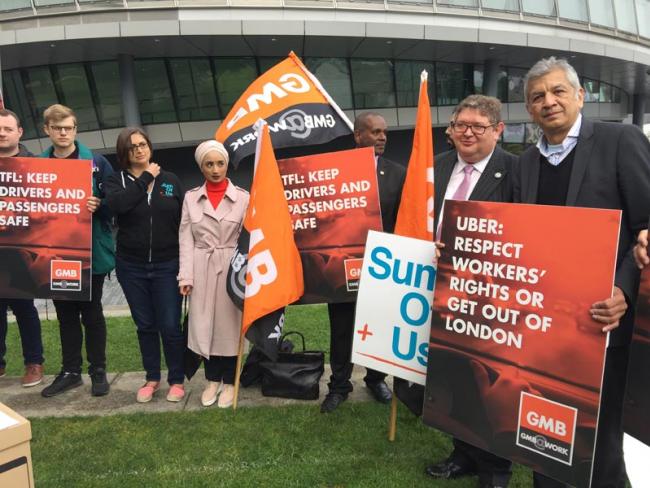
18 September 2017: Delivering a GMB-organised petition against Uber to City Hall, London. Photo Sum of Us (CC-BY-SA 2.0).
Uber cabs, Uber economy, Uber employment – we’re deluged in disinformation about this business model…
An argument about employment is developing here, and it centres on the battle for the taxi market in London and the rest of the country. Transport for London has withdrawn Uber’s operating licence, so too has York. But Uber continues to operate pending appeal, which could take years, appealing to social media to try to bully Transport for London with a monster online petition, allegedly of over 3 million signatories.
London now has an estimated 40,000 Uber drivers among the 120,000 minicab population. There are 21,000 traditional black cab drivers. Taxi trade unions – the Licensed Taxi Drivers Association, RMT, Unite and GMB – are fighting back, organising demonstrations and lobbies of Transport for London.
After unions took Uber to court, the courts have ruled that Uber employs its drivers. But the trade unions’ legal campaign to establish workers’ rights for Uber drivers, though honourable and successful, misses a fundamental point: legal employment status is another form of exploitation.
Uber says that its drivers must be protected from exploitation. It then defines an 18-hour maximum working day within the so-called protections of employment law. That is farcical. Who wants to be driven by someone who has worked 18 hours?
All these employment models are about institutionalising competition between workers to drive wage rates down. They want to make it appear irresistible, undermining workers’ ability to exert control over wages.
‘All these models institutionalise exploitation.’
This is not new. Workers have always experienced institutionalised competition along with rapidly changing technology. This drives wages down and changes both the relations of production and the means of production. That was true during the industrial revolution and the emergence of mass production in the early 20th century. And it’s true now of the changes brought about by development of the microchip.
Uber and similar business models are based on the web and related technology. That doesn’t prevent exploitation.
Trade unions arguing for a level playing field can hold Uber up, for a time. Uber has met significant opposition and some defeats worldwide: in Italy, Spain, Eastern Europe, Australia, China and Russia. But Uber will change the rules of the game, hence the 18-hour “voluntary” day.
Rivals
Uber and its competitors are not benign brain waves dreamed up in a US university. They are all calculated, exploitative, well funded business models. Lyft, a leading US rival, is now looking to compete in Britain – with a £5.5 billion start-up fund.
Lyft sees itself as Uber with a “social conscience” not smeared with Uber’s exploitative attitude or sexual and criminal scandals. But it would get nowhere without massive capital backing and the demands to exploit that brings.
Taxify, based in Estonia, wants to operate in Britain too, using the EU Posted Workers Directive. This allows it to avoid protections of English and Scottish law and to impose Estonian working conditions – worse than anywhere else in Europe.
Pandering to Uber’s claim not to employ any driver, an organisation called FarePilot is trying to move into the operation by acting as an agency for drivers. This agency, mopping up those drivers not working 18 hours a day, is owned by Shell.
The break up of the private hire market is but the start. An additional 40,000, largely diesel Uber cars will pollute London’s streets, but other capitalists have plans too.
Oil companies like Shell see pollution controls as a threat. They are moving into alliances with car manufacturers to produce electric and ultimately driverless cars, to form ride-sharing schemes. Shell, BMW, Daimler, Ford, VW, Audi and Porsche are working on a network of electric car hubs.
What better than a technology-driven driverless private hire market on the streets of every major city? Do away with diesel and petrol pollution, do away with cab drivers, and institutionalise this new so-called employment model. Keep the Greens happy, get rid of those awkward trade unions, get rid of regulation, and let the cash registers keep ringing out with cash!
